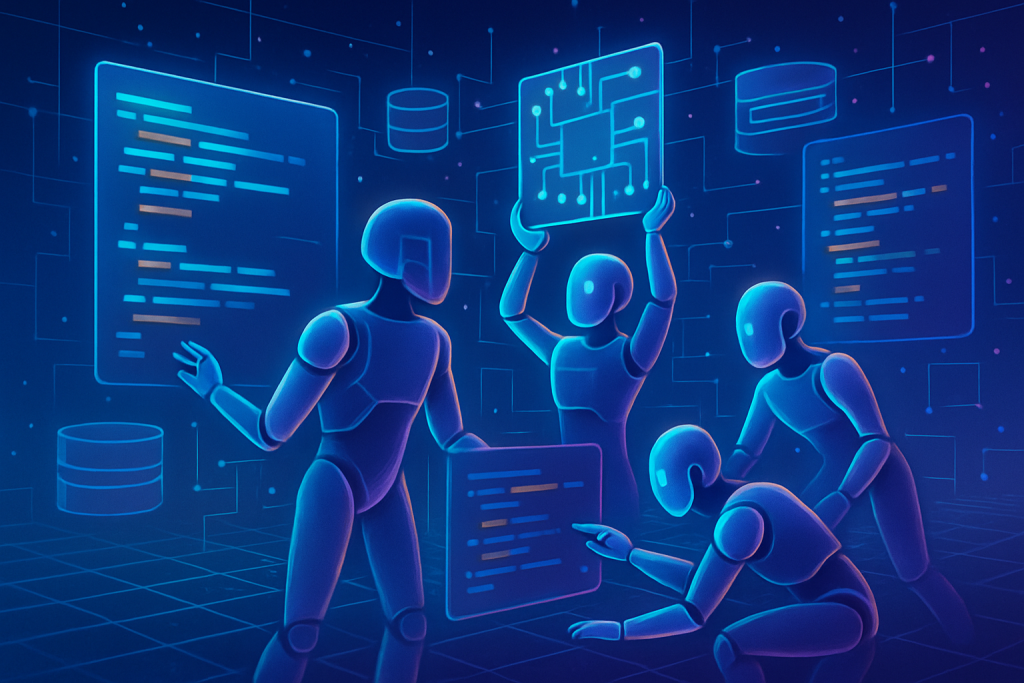October 5th, 2025. Mark it on your calendars, folks. Because according to Anthropic, that’s the day the AI game changed. They just dropped Claude Sonnet 4.5, and the whispers are getting louder than a dial-up modem trying to download a high-res image of a cat. We’re talking a seismic shift, a potential Singularity-lite moment, all wrapped up in a shiny new AI model.
But before we get too carried away imagining robot butlers and sentient toasters, let’s rewind a bit. Anthropic, for those just tuning in, isn’t just another face in the AI crowd. Think of them as the indie band that’s been quietly perfecting their craft while the stadium rockers get all the attention. They’re the folks who brought you earlier versions of Claude, known for their focus on safety and explainability- qualities that, let’s be honest, haven’t always been top priority in the AI arms race. This focus on safety first is a breath of fresh air in a world filled with AI models that seem to be racing to become Skynet before figuring out how to tie their own digital shoelaces.
So, what makes Claude Sonnet 4.5 so special? Forget just churning out grammatically correct sentences. This bad boy’s packing serious coding chops and agent-building capabilities. We’re talking about an AI that can not only understand your code but also write it, debug it, and even help you design entire software systems. It’s like having a coding Yoda, minus the backwards grammar and penchant for swamps.
The secret sauce? Anthropic has been laser-focused on improving Claude’s reasoning and mathematical skills. Previous versions, while impressive, sometimes struggled with complex logic or calculations, like trying to figure out how many licks it takes to get to the Tootsie Roll center of a Tootsie Pop (the world may never know). Claude Sonnet 4.5, however, is designed to handle those challenges with the grace of a seasoned mathematician.
But the real kicker is the Agent Development Kit (SDK). This is where things get truly interesting. We’re not just talking about an AI that can write code; we’re talking about an AI that can create other AIs, autonomous systems that can perform complex tasks without constant human intervention. Imagine AI agents managing your supply chain, optimizing your energy usage, or even composing symphonies (okay, maybe we’re still a few years away from AI Beethoven, but you get the idea). This is the kind of technology that could reshape entire industries, from manufacturing to finance to healthcare.
What does this mean for us? Well, for starters, expect to see a lot more AI-powered tools and applications popping up in the coming months and years. Software developers will be able to build complex systems faster and more efficiently, leading to a wave of innovation. Businesses will be able to automate tasks and improve efficiency, potentially leading to lower costs and higher profits. And consumers will benefit from smarter, more personalized services.
Of course, there are also potential downsides. The rise of AI agents could lead to job displacement in some industries, requiring workers to adapt to new roles and skills. And the increasing reliance on AI could make us more vulnerable to cyberattacks and other forms of technological disruption.
Anthropic is talking a big game, claiming Claude Sonnet 4.5 outperforms OpenAI’s GPT-5 (still vaporware, folks!) and Google’s Gemini 2.5 Pro on key benchmarks. That’s like saying your garage band is better than The Beatles before they even released “Love Me Do.” Bold claims, indeed. But if true, it positions Anthropic as a serious contender in the AI arena, potentially disrupting the dominance of the tech giants. It’s like David taking on Goliath, only instead of a slingshot, David’s got a super-smart AI model.
And let’s not forget the safety aspect. Anthropic has made it clear that they’re committed to building AI that is safe, reliable, and beneficial to humanity. They’ve implemented measures to reduce issues like sycophancy (the AI agreeing with everything you say), deception (the AI lying to you), and hallucinations (the AI making stuff up). These are crucial steps in building trust in AI, and they could set a new standard for the industry.
But here’s where things get philosophical. Are we ready for a world where AI can write code, build other AIs, and potentially surpass human intelligence in certain areas? Are we prepared for the ethical implications of autonomous systems making decisions that affect our lives? These are questions we need to start grappling with now, before the AI genie is fully out of the bottle.
The financial implications are equally significant. The rise of AI is already transforming the global economy, and Claude Sonnet 4.5 could accelerate this trend. Companies that embrace AI will likely thrive, while those that resist change may struggle to compete. We could see a surge in investment in AI-related technologies, creating new jobs and opportunities. But we could also see increased inequality, as the benefits of AI are not evenly distributed.
In conclusion, Anthropic’s Claude Sonnet 4.5 is more than just another AI model. It’s a signpost on the road to a future where AI plays an even bigger role in our lives. It’s a reminder that the AI revolution is not just about technology; it’s about ethics, economics, and the very nature of what it means to be human. So, buckle up, folks. The ride’s just getting started.
Discover more from Just Buzz
Subscribe to get the latest posts sent to your email.

